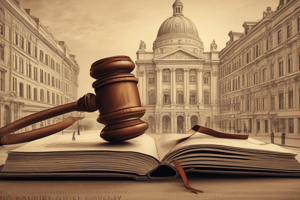Podcast
Questions and Answers
What is the main purpose of creating a trust?
What is the main purpose of creating a trust?
- To avoid paying taxes
- To transfer ownership of property to a friend
- To punish a disobedient child
- To provide protection and benefit for a third party (correct)
What kind of rights does the beneficiary have to the property in a trust?
What kind of rights does the beneficiary have to the property in a trust?
- Legal rights
- Moral rights
- No rights
- Equitable rights (correct)
What is the role of the settlor/testator in a trust?
What is the role of the settlor/testator in a trust?
- To receive the benefit of the trust
- To manage the property for the benefit of the beneficiary
- To transfer the legal title to a trustee, creating a trust (correct)
- To hold the legal title of the property
What type of trust is created when a landowner sets up a trust for their future family?
What type of trust is created when a landowner sets up a trust for their future family?
Who holds the legal title of the property in a trust?
Who holds the legal title of the property in a trust?
What is a result of creating a trust?
What is a result of creating a trust?
Flashcards are hidden until you start studying
Study Notes
A trust is a legally recognized arrangement that allows the property owner, known as the settlor or testator, to transfer their legal title of assets to another individual or entity, designated as the trustee. This trustee has a fiduciary duty to manage and oversee the property on behalf of a third party, often referred to as the beneficiary. The types of property that can be included in a trust are diverse, encompassing real estate, cash, investments, or any other assets, which are collectively referred to as the trust estate. The framework of trusts is designed to ensure that the interests of the beneficiaries are protected and fulfilled according to the terms established by the settlor.
Parties Involved in a Trust
- Settlor/Testator: The original owner of the legal title who transfers it to a trustee, creating a trust.
- Trustee: The individual who holds the legal title of the property and is responsible for managing it for the benefit of the beneficiary.
- Beneficiary: The person who benefits from the trust, having Equitable rights to the property.
Legal and Equitable Ownership
- The settlor/testator has the original legal title, which is transferred to the trustee.
- The trustee holds the legal title, but the beneficiary has Equitable rights to the property.
- This divides the legal and Equitable interests in the same property between the trustee and beneficiary.
Purpose of a Trust
- To provide protection and benefit for a third party, often family members, as seen in the historical context of landowners creating trusts for their future families.
Overview of Trusts
- Trusts can be private Express trusts, implied trusts, resulting trusts, constructive trusts, and discretionary trusts, among others.
- Each type of trust has its own characteristics, formalities, and requirements for establishment.
What is a Trust?
- A trust is a legal relationship where the owner of property transfers the legal title to another individual, not as a gift, but to hold the property for the benefit of a third party.
- The property can be land, private property, money, or a fund, and is held by a trustee for the benefit of a beneficiary.
Parties Involved in a Trust
- Settlor/Testator: The original owner of the legal title who transfers it to a trustee, creating a trust.
- Trustee: The individual who holds the legal title of the property and is responsible for managing it for the benefit of the beneficiary.
- Beneficiary: The person who benefits from the trust, having Equitable rights to the property.
Legal and Equitable Ownership
- The settlor/testator has the original legal title, which is transferred to the trustee.
- The trustee holds the legal title, but the beneficiary has Equitable rights to the property.
- This divides the legal and Equitable interests in the same property between the trustee and beneficiary.
Purpose of a Trust
- To provide protection and benefit for a third party, often family members, as seen in the historical context of landowners creating trusts for their future families.
Types of Trusts
- Trusts can be private Express trusts, implied trusts, resulting trusts, constructive trusts, and discretionary trusts, among others.
- Each type of trust has its own characteristics, formalities, and requirements for establishment.
Studying That Suits You
Use AI to generate personalized quizzes and flashcards to suit your learning preferences.





